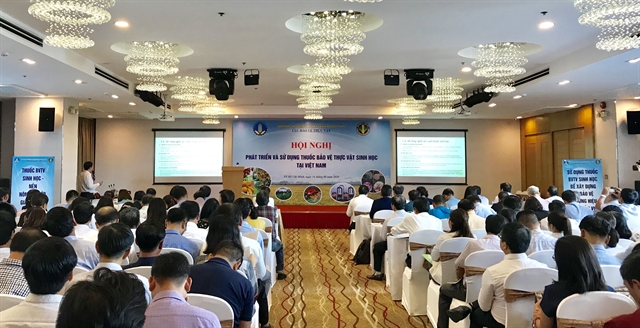 Society
Society


|
| Speakers at a meeting on the use of biopesticides in Việt Nam held on Tuesday in HCM City. — VNS Photo Bồ Xuân Hiệp |
HCM CITY — Việt Nam needs to shift from the use of conventional pesticides to biopesticides to “better manage weed growth, maintain a high agricultural yield, avoid resistant species, protect soil biodiversity and erosion, and reduce green-house emissions,” according to experts.
Conventional pesticides are synthetic chemicals or agrochemicals which kill or inactivate pests. Biopesticides, on the other hand, are naturally occurring bioactive organisms or substances.
Biopesticides kill harmful organisms directly or work indirectly by interfering with reproduction or simply repelling pests with substances they don’t like.
Most biopesticides do not provide a “quick kill”, but rather suppress pests so that they can be managed over time. They also tend to decompose quickly and leave fewer residues on food and in the environment, experts said.
However, pesticides are widely used due to their “low cost and high efficiency”. But they may harm human health, pollute the environment and endanger the ecosystem.
Speaking at a meeting on the use of biopesticides on Tuesday in the city, Deputy Minister of Agriculture and Rural Development Lê Quốc Doanh said the ministry’s Plant Protection Department should develop a project on biopesticides in production, trading and consumption.
He said the ministry aims to increase the use of biopesticides by 30 per cent (which means reducing the use of pesticides by 30 per cent) next year.
“It is vital to encourage farmers and enterprises to apply a pesticide-free agricultural model, gradually replacing pesticides by biopesticides.”
The use of pesticides plays a major role in increasing food production in the agriculture sector, but it has an impact on human health, the environment and natural resources, according to the Department of Plant Protection.
“Tonnes of pesticides are released into open fields and their surroundings every day, which not only puts human health at risk, but also interferes with the biological processes of nature and the ecosystem services it offers to combat weeds and other pests,” it said.
As a result, weeds become resistant, the soil gets eroded and infertile, the crops become susceptible to pathogens and diseases, and farmers use more pesticides to combat the new pests, and end up trapped in a “pesticide treadmill”.
Challenges
Dr Nguyễn Xuân Hồng, chairman of the Biopesticides Advisory Council, said while biopesticides offer a lot of advantages, they aren’t always the best solution. Because they are not commonly used and have very specific application requirements, growers need training to use biopesticides effectively.
Since they are highly targeted, growers need different products to control different kinds of pests and pathogens. And biological pesticides aren’t available for all kinds of pests. In some cases, a synthetic agrochemical is the only option.
Other challenges with biopesticides involve maintaining microbial viability during storage and compatibility with pesticides. Advances in formulation are extending storage shelf-life and compatibility of mixed products.
Difficulties in managing biopesticides included the user’s lack of knowledge about the chemicals. The growing number of shops and dealers trading the chemicals and loose management from local authorities and relevant agencies are also challenges, he said.
Hồng called for policies facilitating the research and application of environmentally friendly solutions such as the use of biopesticides to reduce the use of chemicals.
Dr Trần Đại Lâm, deputy head of the Academy of Science and Technology, said there was an urgent need to develop technological methods of agriculture that do not depend on pesticide use.
“A strategy for the use of biopesticides in Việt Nam is needed,” he said.
In order to enhance the wider use of pesticides, reform regulations and increase communication to change awareness, it is also important to create a market for pesticide development, he added.
Dr Phạm Hữu Nhượng, deputy director of the HCM City Biotechnology Centre, said farmers should be advised to use biopesticides only if necessary, and select products with clear origins.
Along with tightening the management of pesticides products, training for farmers on how to use the chemicals responsibly and effectively is a must, he added.
In 2019, the Vietnamese biopesticides market was estimated to be worth nearly US$31 million. The figure is expected to reach $65.7 million by 2024. This shows an increasing interest in research, development and use of pesticides in the country. — VNS

.jpg)


